"A Working Periscope.
This little project came about because of a discussion on the bulletin board of another well known model submarine organisation. S----------- You know who!
There comes a point in every model submariner’s life when you just have to have a working periscope.
What type of system to use?
Well you could go to a certain well known German supplier of submarine bits and you would get something that is beautifully engineered, electrically driven and complete with limit switches. It also is quite big, complicated and expensive and only suitable for certain models.
I was looking for something much simpler that could be adapted to different situations and could be knocked up by the dwindling band of scratch builders out there. You know who you are.
I digress slightly but I think that our hobby can be divided into 2 groups the “scratch builders” and “the builders of large Airfixes”! At a recent show my scratch built model (hundreds of hours of work including a visit to Greenwich for the original drawings.) was called “Homemade” sort of like a WI cake!
Right then I will get down off my soapbox and continue this article.
A lot of people were trying to waterproof servos to raise the scopes. I had a play with this but I never liked the idea of a servo used in sacrificial mode (You have no way of inspecting for leaks and you are just waiting for it to fail.) You also have to use fiddly little cables and waterproof plugs.
Bill Marks on the bulletin board suggested the use of syringes and pistons to do it. This was more like it! Hydraulics - much more like the real thing.
A few experiments suggested that it had potential. Syringes are cheap and the piston seal is excellent and reliable. Tubing is easier to run through bulkheads and into the outer hull in submarines than electrical wiring. It is generally more rugged
I had some trouble getting the periscope end to work. My initial trials were plastic rods (the scopes) pushed into brass tubing. There was either too much friction or too much leakage.
Building it.
I eventually came up with the use of a floating piston, about 10mm long inside the brass tube (approx 5mm OD). I turned this from solid PTFE on my trusty Peatol lathe. You want it to be a slightly sloppy fit in the brass tube. Sort of “lap” it in by pushing it backwards and forwards in the tube.
I think you will find that PTFE is best from the friction point of view.
.f you don’t have a lathe, I’m sure it would be possible to grind it down to size by placing it in a drill chuck and carefully using a combination of file, sandpaper and /or even a Dremel with an abrasive wheel.
The floating piston is retained in the bottom end of the tube by Dremelling a small slit part way across the tube. Either push the brass in or trap some wire in the slit to retain the piston. Silicone rubber tubing can be slipped over this end with no leaks,
The plastic rod “scope” (I used carbon fibre rod because I happened to have some)
rests on the floating piston. You will need to make the diameter of the rod at this end slightly larger to prevent the scope being launched. (Trident missile development perhaps!) I used a blob of epoxy.
Dremel a number of small slits around the end of the brass tube and push them in to retain the scope. You should reinforce this a little with soft solder or epoxy to prevent inadvertent launch of your scope.
Connect up your test syringe filled with water and you will get the idea. Don’t worry about the odd leak from the periscope. In practice the system works well with a mixture of water and air and there is plenty more water available to leak in when you retract the scope!
Fitting the unit in your sub.
The 10 ml syringe is driven from a standard servo placed somewhere inside your WTC via the beam and linkage arrangement shown in the photograph. Plug the servo in to a spare channel. If you have a computer transmitter you can use servo slow etc.
To connect the syringe up to the outside (underwater) world, I used a combination of silicone rubber fuel tubing and 4mm OD nylon pneumatic tubing.
This is very useful stuff for all sorts of sub uses. It pushes easily into fuel tubing and it is very tough. You can run it between the WTC and the outer hull on most models.
I obtained the nylon tube and syringes on Ebay. (You can obtain syringes at Chemists but you tend to get funny looks!
First Trial_ Merstham Show 2006
I demonstrated this in front of the massed ranks of the normally friendly and supportive.AMS members to profound indifference! Funny thing genius! Ah well.
Future improvements?
A smaller syringe and servo may be possible. Alternatively the current arrangement could power several masts and maybe other things through pistons or small bellows- flags, crew members lifting binoculars or giving Nazi salutes etc (I can’t think who I am thinking of!) Have fun – I did!"
David Forrest

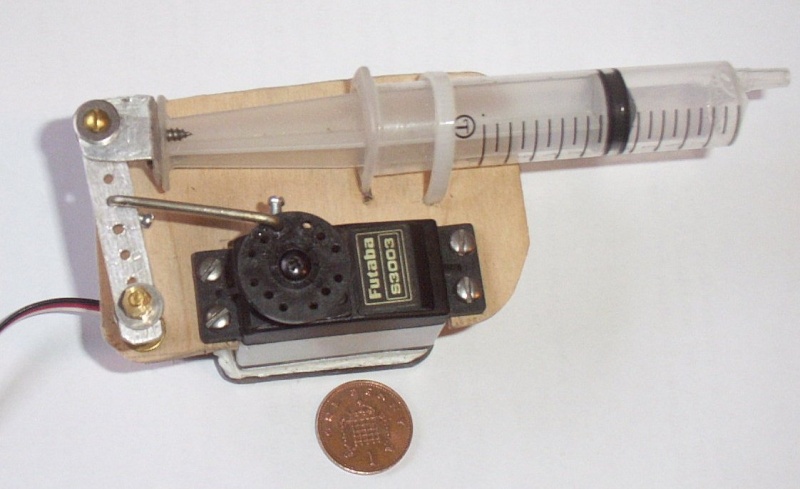
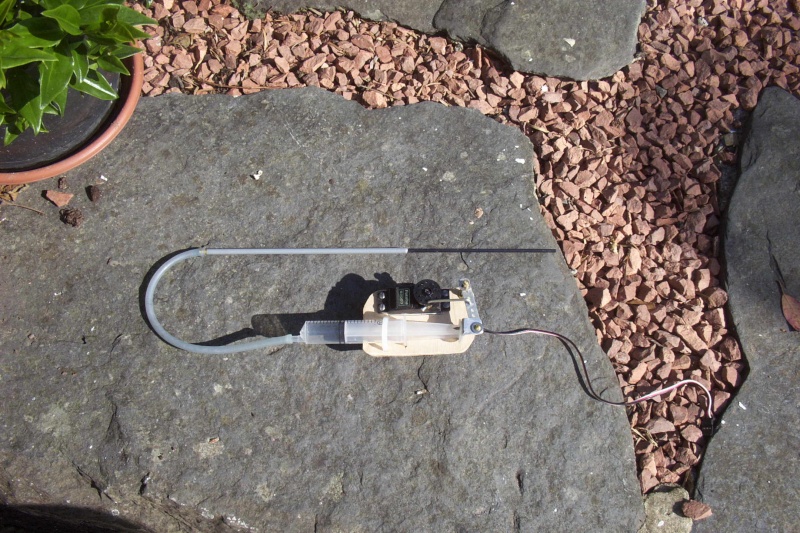
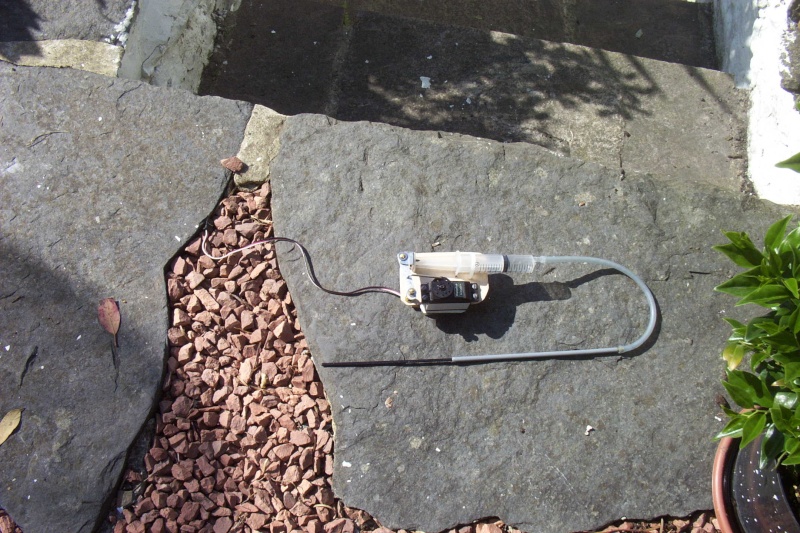
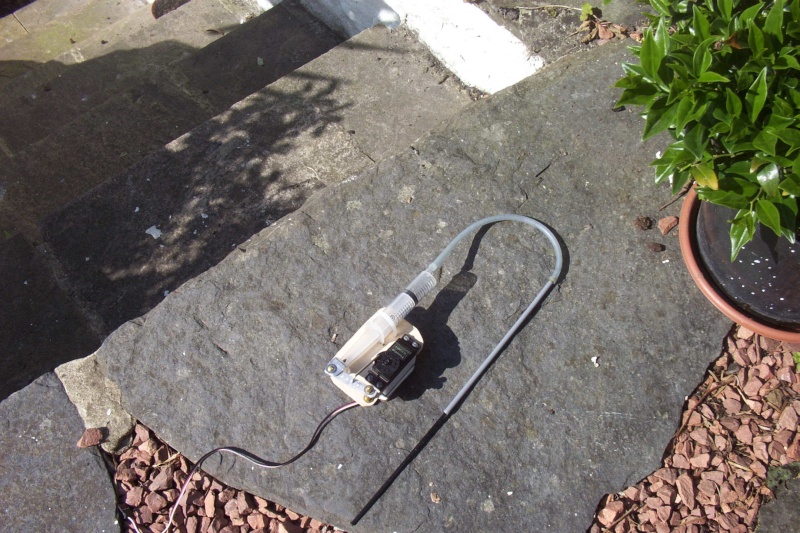
Posted with the permission of David Forrest...
This little project came about because of a discussion on the bulletin board of another well known model submarine organisation. S----------- You know who!
There comes a point in every model submariner’s life when you just have to have a working periscope.
What type of system to use?
Well you could go to a certain well known German supplier of submarine bits and you would get something that is beautifully engineered, electrically driven and complete with limit switches. It also is quite big, complicated and expensive and only suitable for certain models.
I was looking for something much simpler that could be adapted to different situations and could be knocked up by the dwindling band of scratch builders out there. You know who you are.
I digress slightly but I think that our hobby can be divided into 2 groups the “scratch builders” and “the builders of large Airfixes”! At a recent show my scratch built model (hundreds of hours of work including a visit to Greenwich for the original drawings.) was called “Homemade” sort of like a WI cake!
Right then I will get down off my soapbox and continue this article.
A lot of people were trying to waterproof servos to raise the scopes. I had a play with this but I never liked the idea of a servo used in sacrificial mode (You have no way of inspecting for leaks and you are just waiting for it to fail.) You also have to use fiddly little cables and waterproof plugs.
Bill Marks on the bulletin board suggested the use of syringes and pistons to do it. This was more like it! Hydraulics - much more like the real thing.
A few experiments suggested that it had potential. Syringes are cheap and the piston seal is excellent and reliable. Tubing is easier to run through bulkheads and into the outer hull in submarines than electrical wiring. It is generally more rugged
I had some trouble getting the periscope end to work. My initial trials were plastic rods (the scopes) pushed into brass tubing. There was either too much friction or too much leakage.
Building it.
I eventually came up with the use of a floating piston, about 10mm long inside the brass tube (approx 5mm OD). I turned this from solid PTFE on my trusty Peatol lathe. You want it to be a slightly sloppy fit in the brass tube. Sort of “lap” it in by pushing it backwards and forwards in the tube.
I think you will find that PTFE is best from the friction point of view.
.f you don’t have a lathe, I’m sure it would be possible to grind it down to size by placing it in a drill chuck and carefully using a combination of file, sandpaper and /or even a Dremel with an abrasive wheel.
The floating piston is retained in the bottom end of the tube by Dremelling a small slit part way across the tube. Either push the brass in or trap some wire in the slit to retain the piston. Silicone rubber tubing can be slipped over this end with no leaks,
The plastic rod “scope” (I used carbon fibre rod because I happened to have some)
rests on the floating piston. You will need to make the diameter of the rod at this end slightly larger to prevent the scope being launched. (Trident missile development perhaps!) I used a blob of epoxy.
Dremel a number of small slits around the end of the brass tube and push them in to retain the scope. You should reinforce this a little with soft solder or epoxy to prevent inadvertent launch of your scope.
Connect up your test syringe filled with water and you will get the idea. Don’t worry about the odd leak from the periscope. In practice the system works well with a mixture of water and air and there is plenty more water available to leak in when you retract the scope!
Fitting the unit in your sub.
The 10 ml syringe is driven from a standard servo placed somewhere inside your WTC via the beam and linkage arrangement shown in the photograph. Plug the servo in to a spare channel. If you have a computer transmitter you can use servo slow etc.
To connect the syringe up to the outside (underwater) world, I used a combination of silicone rubber fuel tubing and 4mm OD nylon pneumatic tubing.
This is very useful stuff for all sorts of sub uses. It pushes easily into fuel tubing and it is very tough. You can run it between the WTC and the outer hull on most models.
I obtained the nylon tube and syringes on Ebay. (You can obtain syringes at Chemists but you tend to get funny looks!
First Trial_ Merstham Show 2006
I demonstrated this in front of the massed ranks of the normally friendly and supportive.AMS members to profound indifference! Funny thing genius! Ah well.
Future improvements?
A smaller syringe and servo may be possible. Alternatively the current arrangement could power several masts and maybe other things through pistons or small bellows- flags, crew members lifting binoculars or giving Nazi salutes etc (I can’t think who I am thinking of!) Have fun – I did!"
David Forrest





Posted with the permission of David Forrest...
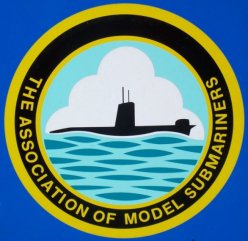




» Futaba -868/915mhz equipment
» Darnell type 21 submarine, need some help
» Robbe Seawolf V2
» bladder bags
» WW2 mini sub build
» Peral Submarine of 1888
» U-Boat R/C?
» Cheap Arduino Auto leveler